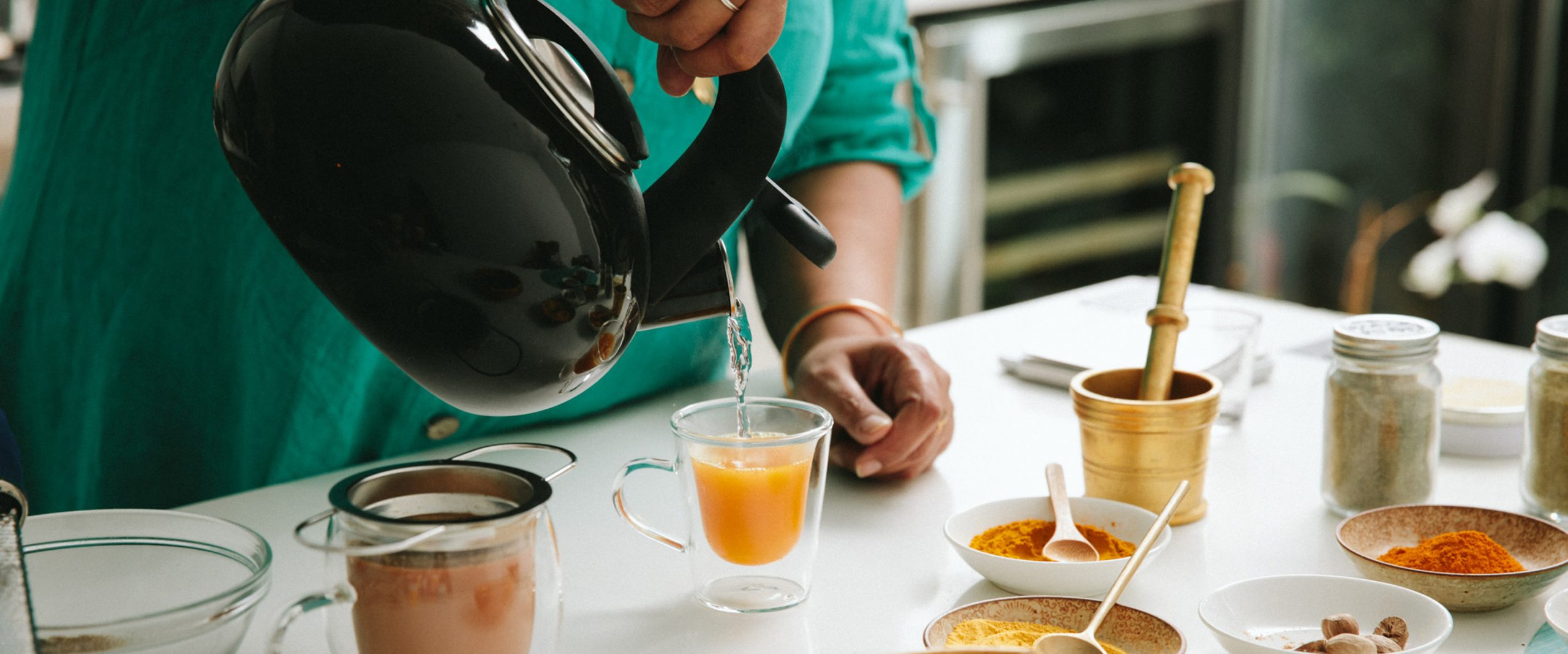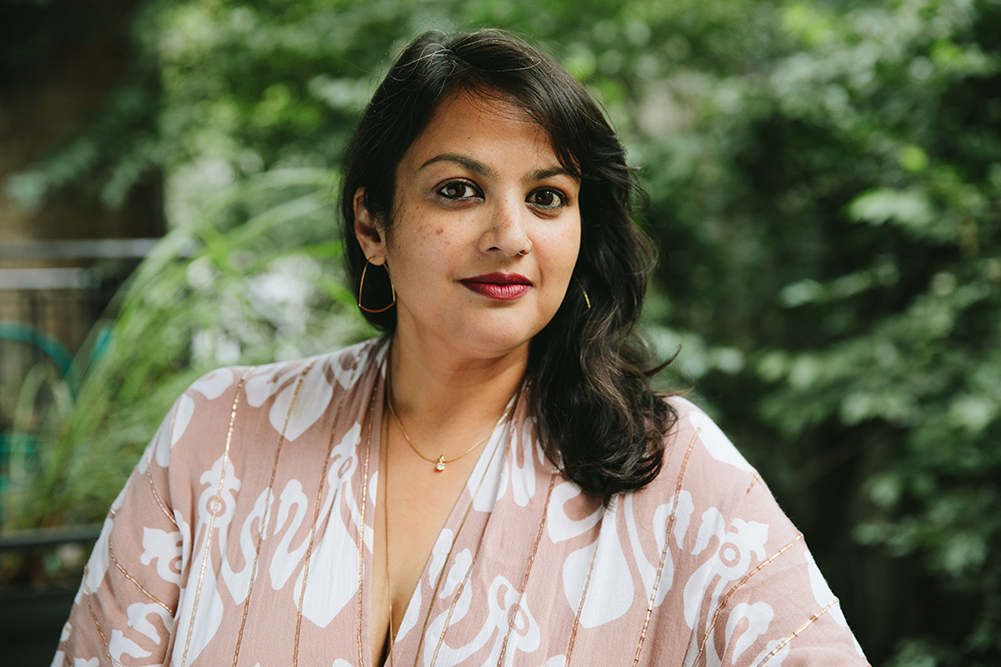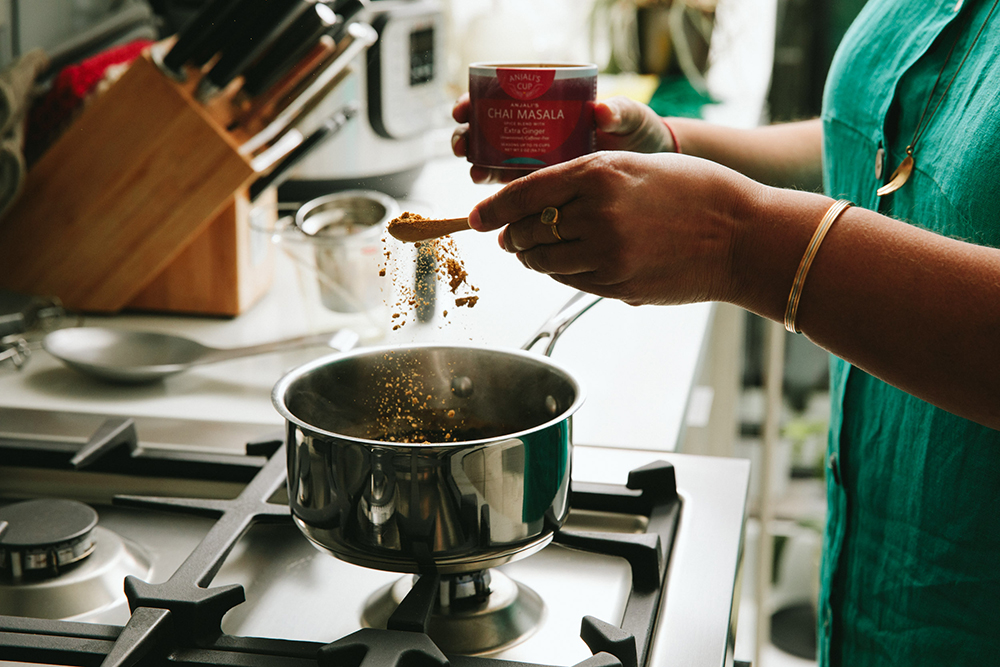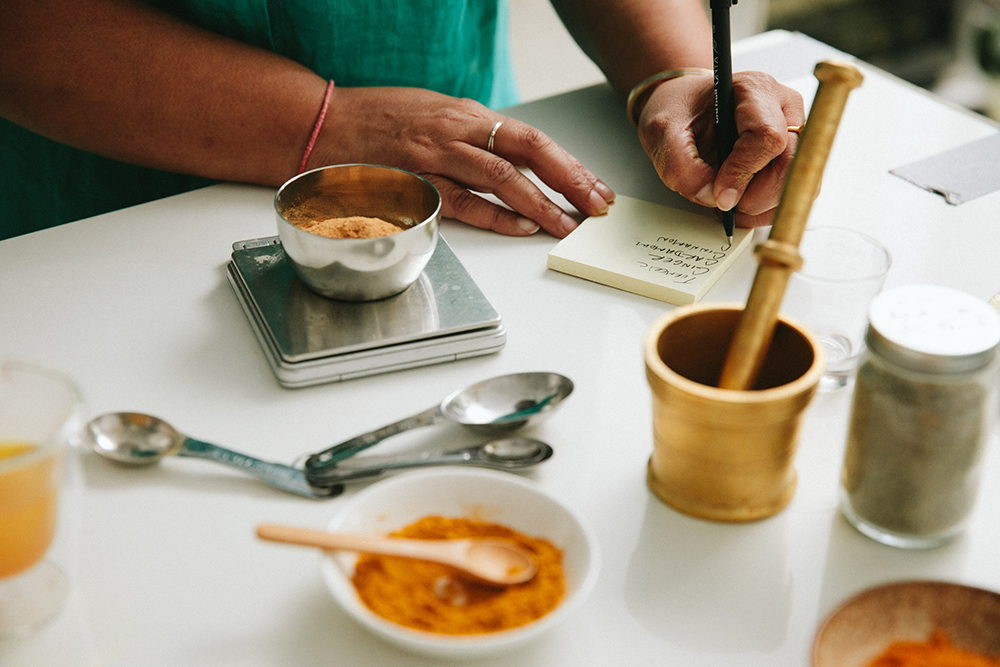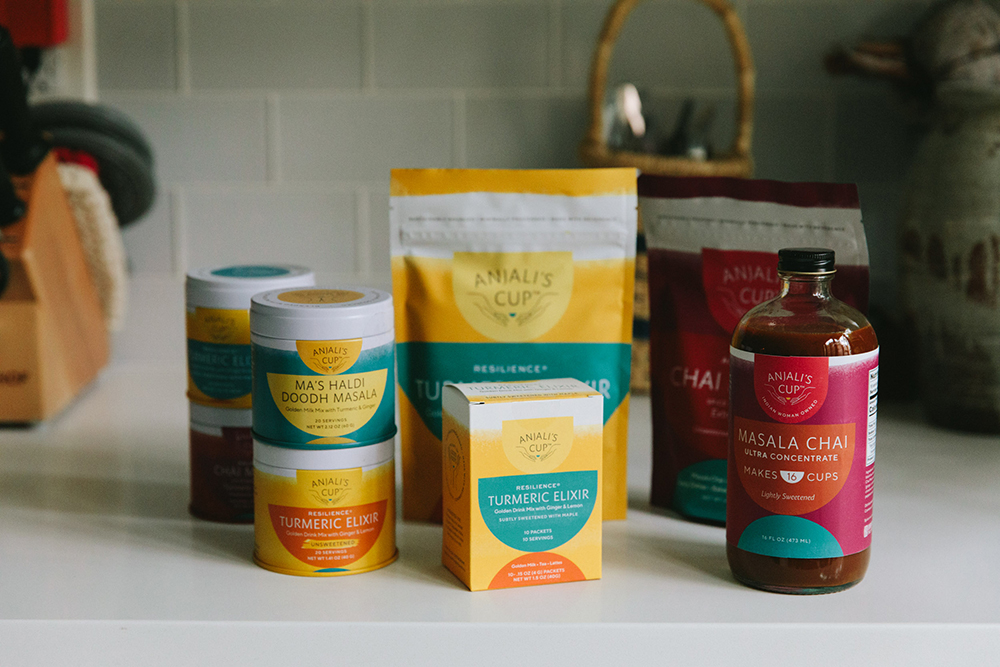When the Brooklyn-based creator Anjali Bhargava pivoted from a career in portrait photography to food entrepreneurship, it was a "dark time," she says.
"I'd become very disillusioned with the art world, with the photography industry, and not knowing what I was gonna do with the rest of my life."
As many of us have done in times of despair, Bhargava retreated to the kitchen, where she spent a summer flexing her creativity.
"I'm not a great cook, but I'm a great experimenter."
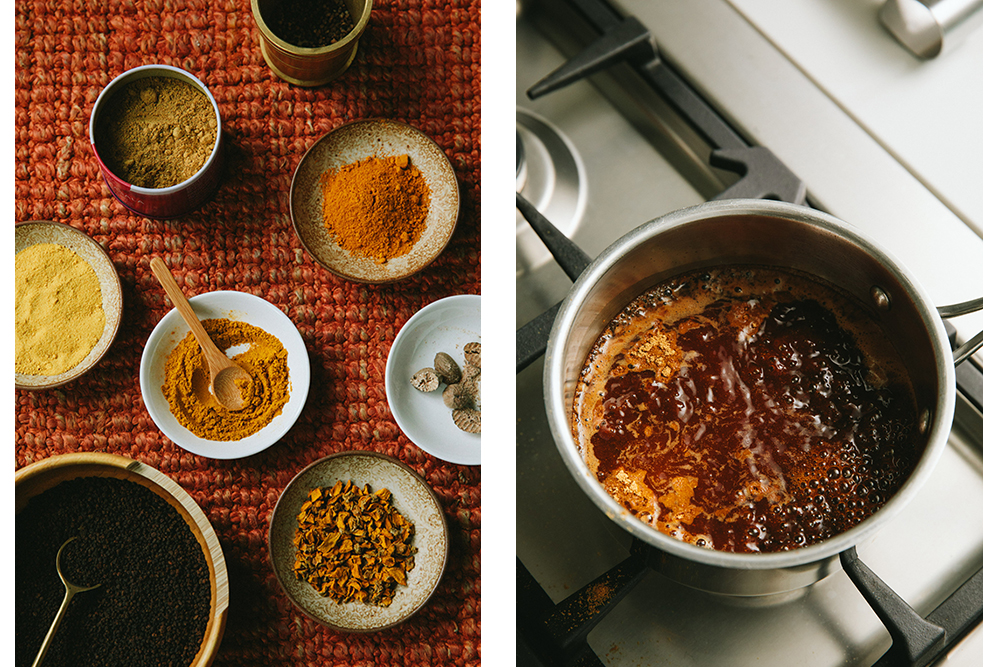
(left) Some of the beautiful, fresh spices Bhargava uses to create her blends. (right) Masala Chai simmering on the stovetop.
For her mother's birthday, she made a snack so delicious that she decided to scale it, launching a line of decadent nuggets made from organic toasted sesame seeds and coconut, cacao nibs, chia and flax seeds, sea salt, cayenne, coconut sugar, coconut oil and agave.
Bhargava wrote a business plan, borrowed money from her parents, and went to work, often devoting 80 hours a week. Her startup years echo the tale of a lone artist toiling away in their studio, creating a masterpiece. What came next wasn't fame or riches but debilitating migraines.
"I'd have these light flashes and my ears would ring and I'd have to put my head between my legs."
Bhargava relied on over-the-counter pain relievers until turning to Ayurveda, an ancient Indian medical system and holistic healing approach. Recalling how her mother had used turmeric to treat all kinds of ailments, she mustered the energy to make herself a fresh turmeric, ginger and lemon tonic every morning.
When asked what Ayurveda says about turmeric, Bhargava asked if I'd ever seen My Big Fat Greek Wedding, where the father uses Windex for everything, even his daughter's pimple.
"That's how turmeric is in Indian culture."
Her biggest self-care challenge was preventing the golden root from spoiling before she could finish using it. After trying different DIY preservation methods at home, which became too laborious to sustain, she turned to local grocers for solutions.
Why can't I make a better powder?
"I tried all these turmeric powders and, because they're so overprocessed, they weren't giving me the tangible short-term benefit that the fresh root was giving me. I took out my dehydrator and was like, "Why can't I make a better powder?""
In her quest to eliminate migraine headaches, Bhargava was unknowingly starting the next chapter in her business: a series of turmeric-based drink mixes and spice blends motivated by her own healing.
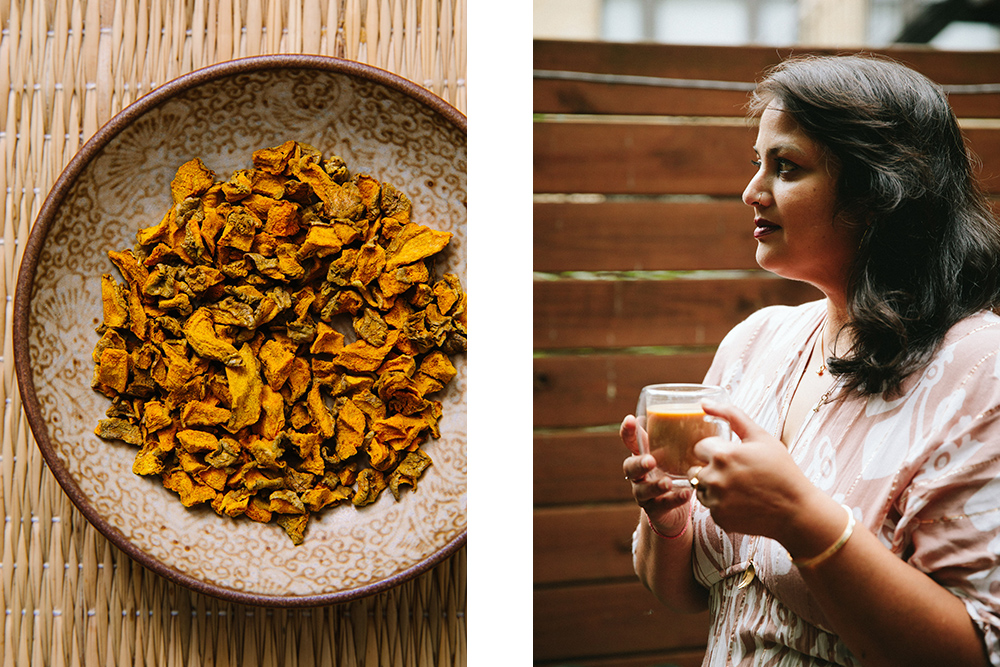
(left) Dehydrated turmeric, milled fresh at low temperature for each batch. (right) Bhargava enjoying a cup of Masala Chai.
After two months of consuming her dehydrated turmeric blend daily, Bhargava's migraines subsided along with the inflammation that triggered her psoriasis, an autoimmune condition she's lived with since the age of eight.
"Inflammation is something we all deal with, and I felt like if I could actually cure my migraines with it, there were so many other things that could be done."
After finding a certified organic regenerative agriculture farmer in Hawaii growing "the best turmeric on the planet," Bhargava created her signature product, Resilience Turmeric Elixir.
"I can't make medical claims, but the approximately 400 milligrams in a serving of my Elixir is the equivalent of two or three grams of fresh root, which is all you need to get short-term benefits."
Brands with less attention to quality, she explained, may provide more milligrams, but "will be harder on the liver with prolonged use," says Bhargava. "And with turmeric, the key is to have smaller amounts on a consistent basis so we can receive the cumulative benefits of the turmeric."
In 2017, she discontinued the nuggets that launched her business and, in subsequent years, went "all in" on her elixir. In 2020, Bhargava expanded by adding a Chai Masala to her product line as part of a collaboration with the ethically-minded spice purveyors at Burlap and Barrel. This led to a major re-branding as Bhargava retired her old business name, Bija Bhar, in favor of Anjali's Cup.
"I owe [Burlap and Barrel] a huge debt of gratitude because I had talked to them right before the pandemic about sourcing their ingredients to make this Chai Masala," said Bhargava, who was initially planning to launch the product on her own, but realized she couldn't take on the cost. "At some point, I went to them and was like, 'I don't have it in me.'"
Bhargava was also battling exhaustion again, brought on this time by the grief of losing her father before the pandemic lockdown and by the coronavirus itself, which she contracted that first month of shelter-in-place orders in New York. Her breathing capacity dropped concerningly low and her psoriasis returned with near-debilitating intensity.
"I was in bad shape [and] overnight saw 50% or 60% of my revenue getting killed because all my coffee shops were closed."
Plenty has been written about the economic impact of the pandemic on the food industry, but not enough about its lingering effects on the bodies of people whose mission is to nourish us.
Two years after catching Covid, Bhargava was still dealing with shortness of breath, brain fog, and fatigue. Today, she's among the 1 in 13 adults in the U.S.-or 17 million people-who have long Covid, a collection of symptoms that continue to confound researchers as much as the people who suffer from it.
"The way that I think it impacted my cognitive abilities scared me for a long time. But I'm realizing that I'm still capable and I'm still pushing forward."
Plenty has been written about the economic impact of the pandemic on the food industry, but not enough about its lingering effects on the bodies of people whose mission is to nourish us.
These days, Bhargava lets natural alignment and a sense of flow guide her business, delicately balancing tenacity and self-compassion.
Little about Bhargava's journey in the food world is unique. In fact, it's the relatability of her story-the burnout and recovery, the joy and grief, the risks and rewards-that drew me in.
What Bhargava's journey moves me to remember, particularly amid the widespread desire to quickly move on from the pandemic, is just how much we go through to get to where we are.
"I made a product called Resilience, and now it's not letting me go," she said. "I'm constantly having to prove my own resilience to myself."









